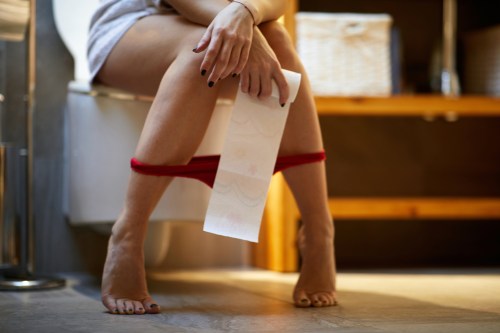Our editors independently select these products. Making a purchase through our links may earn Well+Good a commission
Have you ever had what feels like constipation and diarrhea at the same time? It might sound like a paradox—running to the toilet because you have to "go," but then straining once you get there, and then having loose stool—but it's totally possible. The condition is aptly named paradoxical diarrhea1 (or overflow diarrhea) and it happens when watery stool seeps around hard poop stuck in your rectum (i.e., the end of your large intestine).
Experts in This Article
board-certified gastroenterologist at the Gastroenterology Institute of Southern California
Overflow diarrhea can resemble a regular case of "the runs," but it usually happens to people with chronic constipation2. While anyone can feel backed up from time to time, some folks are more likely to have long-term constipation, including those over age 65, those who don't eat enough high-fiber foods, those who take certain medications, or people with neurological or digestive diseases (like Parkinson's disease or irritable bowel syndrome).
Curious to know whether this is what's happening to you? Read on to learn top causes, management options, and prevention tips for overflow diarrhea—according to gut health experts.
What are the symptoms of overflow diarrhea?
“Overflow diarrhea is a type of diarrhea that happens when the large intestines are partially blocked (usually from constipation or fecal impaction), causing a buildup of stool behind the obstruction,” Peyton Berookim, MD, FACG, a board-certified gastroenterologist at the Gastroenterology Institute of Southern California, tells Well+Good. “This blockage results in liquid stools leaking around the blockage,” Dr. Berookim says. He notes that other symptoms—beyond diarrhea and constipation—may include the following:
- Bloating
- Abdominal distension
- Abdominal discomfort
What causes overflow diarrhea?
In most cases, overflow diarrhea is a symptom of another underlying health issue. Here's a closer look at what some of those conditions may be.
1. Irritable bowel syndrome (IBS)
“IBS is a chronic gut condition characterized by chronic abdominal pain that occurs with altered bowel habits (either constipation or diarrhea),” Dr. Berookim says. Research shows there are four subtypes of IBS3:
- IBS with constipation (IBS-C): Most of your poop is hard and lumpy and you have abdominal pain.
- IBS with diarrhea (IBS-D): Most of your poop is loose and watery with abdominal discomfort.
- IBS with mixed bowel habits (IBS-M): You alternate between loose stools and constipation with abdominal discomfort.
- Undefined subtype (IBS-U): Symptoms may vary between all of the above.
When you have IBS-C, in particular, the chronic constipation can cause a partial blockage in your intestines, Dr. Berookim says. And when solid poop can’t pass through your pipes, watery stool might leak around it, leading to overflow diarrhea. Along with constipation and diarrhea, people with IBS will also typically experience gas and bloating.
How to treat it:
One of the first lines of treatment for IBS includes making changes to your diet. Dr. Berookim says this could look like:
- Increasing fiber-rich foods. Eating fruits, vegetables, grains, prunes, and nuts can help with constipation.
- Limiting dairy products. Many people with IBS have a lactose intolerance.
- Limiting foods that can make you gassy to go easier on your gut.
- Avoiding gluten when possible: People with IBS—even those without celiac disease—tend to be more sensitive to gluten.
- Trying the low FODMAP diet: This diet involves reducing the amount of certain hard-to-digest carbohydrates you eat, like beans, apples, and wheat-based products.
- Drinking plenty of water: Aim to have anywhere from 11.5 to 15.5 cups of water per day through drinking and eating water-rich foods. This will help keep your GI tract lubricated and help treat or prevent constipation.
There are also other treatment options available, like medication (namely antidepressants, fiber supplements, laxatives, or medicines to help with intestinal spasms) and talk therapy—to help cope with stress that might trigger IBS symptoms4.
Gut health experts may also recommend other lifestyle tips to keep IBS in check, such as exercising daily, meditating5 or trying other stress-relief practices, and getting enough sleep every night.
2. Fecal impaction (aka stuck poop)
Fecal impaction happens when poop gets stuck in your rectum, keeping you from passing stool. Overflow diarrhea can develop when liquid stool leaks around the poop blockage, Dr. Berookim says. This is usually caused by chronic constipation because, if you can't move your bowels, they will get severely backed up over time. Other causes of fecal impaction can include the following:
- A sedentary lifestyle
- Neurological conditions (like Parkinson's disease or Alzheimer's disease)
- Side effects of certain medications (like narcotic pain medications, anticholinergics for muscle spasms, and certain anti-diarrheal medications)
You might also notice some other symptoms with fecal impaction, including abdominal pain, inability to eat, frequent urination, nausea, dehydration, confusion, or bleeding, per Mount Sinai.
How to treat it:
Treating fecal impaction involves your healthcare provider removing the blockage, which can be done in a few ways6. The first is with an enema—where fluid is injected into your rectum to loosen poop—or physical assisted removal—where your provider uses a gloved finger to dislodge the impaction. Other options include abdominal massage to loosen stool, laxatives, or surgery, in severe cases.
3. Food allergies
“Food allergies can cause inflammation in the digestive tract resulting in diarrhea,” Dr. Berookim says. But this type of loose stool is often just regular diarrhea, not the overflow kind. However, "in extremely rare cases, the inflammatory response7 may lead to swelling of the intestines," he adds, which may cause a potential blockage and eventual overflow diarrhea.
Additionally, food allergies or sensitivities (like lactose intolerance) can worsen IBS symptoms8, and, as we learned, people with IBS-C are more prone to chronic constipation and possibly overflow diarrhea.
How to treat it:
Keep a food diary to track your symptoms. This can help you identify if a particular food is triggering your tummy troubles. Once you figure out which food is causing problems, you can limit or eliminate it from your diet, with the guidance and support of your healthcare provider.
4. Bacterial infections
Certain bacterial infections can “cause inflammation, scarring, and possible stricture of the intestines, resulting in overflow diarrhea,” Dr. Berookim says. These include:
- Clostridium difficile (C. diff): An intestinal infection that often occurs after taking antibiotics, which kill off other helpful bacteria.
- Shigella: An intestinal infection caused by contact with stool of an infected person or eating contaminated food or water.
- Salmonella and Campylobacter: Two common types of food poisoning.
While diarrhea is the most common symptom, you can also experience stomach pain, nausea, and vomiting with these bacterial GI infections.
How to treat it:
For most bacterial infections, you will need to see a healthcare provider who can prescribe an antibiotic medication to kill the bad bacteria in your gut. And since some of these infections are highly contagious, like shigella, it's recommended to get treatment ASAP, to avoid spreading it to other people.
5. Inflammatory bowel disease (IBD)
IBD is a group of medical conditions that happen when you have chronic inflammation that damages your gastrointestinal (GI) tract. The most common are Crohn's disease and ulcerative colitis, both of which can cause scarring and potential abnormal narrowing of the intestines, which can trigger overflow diarrhea, says Dr. Berookim. You may also experience abdominal pain, rectal bleeding or bloody stools, weight loss, and fatigue with IBD, according to the Centers for Disease Control and Prevention (CDC).
Beyond IBD, Dr. Berookim says there are a few inflammatory gut health issues that don't fall under the IBD umbrella that can lead to overflow diarrhea, too, such as diverticulitis—inflammation of your diverticula, or pockets on the inside of your colon.
How to treat it:
If you think you might have IBD, visit with your healthcare provider, who can run diagnostic tests and take stock of your symptoms. If you have a form of IBD, treatment often includes a multi-pronged approach, including various medications to reduce gut inflammation and pain and lifestyle changes—like adopting an anti-inflammatory diet and reducing stress.
6. Certain medications
The contents of your medicine cabinet might be the culprit of your overflow diarrhea. For example, “the main side effect of pain medications, such as opioids, is severe constipation,” Dr. Berookim says. Why? Essentially, these medications make the nerves in your gut sleepy, thereby slowing things down in your GI tract. With long-term use, this can lead to chronic constipation and overflow diarrhea, he adds.
But opioids aren’t the only offenders. Other drugs including antidepressants, blood pressure medications, and anticholinergics (found in meds for urinary incontinence and allergies) may also cause constipation as a side effect.
How to treat it:
If you think your medication is messing with your gut, let your healthcare provider know. They may be able to prescribe you a lower dose of a particular drug or prescribe you something new altogether. Just be sure to talk to your provider before quitting your meds cold turkey.
Additionally, you might be able to counteract medication-induced constipation through a variety of lifestyle changes like adding fiber-rich foods to your diet (think: beans and greens), staying well-hydrated, taking fiber supplements, or using other over-the-counter (OTC) remedies, such as Miralax—with a provider's permission, of course.
7. In rare cases, a mass or tumor in the rectum
In some cases, a physical blockage—like a mass or tumor—might be responsible for obstructing your intestines and backing you up in the bathroom. More specifically, Dr. Berookim says that tumors in the rectum or distal (lower) portion of the colon can cause blockages of stool and potential overflow diarrhea.
While most rectal masses are benign—think, harmless polyps or fatty lumps called lipomas—others can be cancerous. If that is the case, you might notice other signs and symptoms like rectal bleeding, a sudden change in how and when you poop, fatigue, weakness, abdominal pain, or unexplained weight loss.
How to treat it:
If you think you have a rectal mass or tumor, it's best to check in with your healthcare provider, especially since they can be cancerous. Your provider will likely perform a physical exam and a colonoscopy to get a better look inside your intestines. If they find any abnormal masses, they may perform surgery to remove them, or recommend certain therapies (such as chemotherapy or radiation) depending on the severity of the mass.
Are there any long-term complications of overflow diarrhea?
Unfortunately, if left untreated, there are some potential long-term complications of overflow diarrhea beyond just being uncomfortable. Dr. Berookim says this may include the following:
- Dehydration and nutrient deficiencies from chronic loss of fluids
- Hemorrhoids (popped veins on the anus) or anal fissures (small tears in anal lining) from straining during bowel movements or irritation
- Fecal incontinence (i.e., unintentionally leaking poop) from weakened anal muscles
- Skin irritation and soreness around the anus
- Bacterial and fungal skin infection (due to constant moisture breaking down skin)
Additionally, your “quality of life can be severely impacted with chronic diarrhea,” Dr. Berookim says.
How to treat overflow diarrhea
First and foremost, treating overflow diarrhea requires a healthcare provider's assistance. They may recommend a few different routes to treat the GI condition, according to Dr. Berookim. Since most cases are a result of fecal impaction and chronic constipation, your provider will need to remove blocked stool with an enema or physical removal with a gloved finger. Your provider may also try performing an abdominal massage to target stuck stool or suggest taking laxatives to help soften things up.
In severe cases, however, surgery to remove the blockage may be required. Your provider can request an MRI or other screening test to check the severity of the blockage and determine the course of treatment from there.
Tips to prevent simultaneous constipation and diarrhea
The best way to prevent overflow diarrhea? Getting chronic constipation under control. Here are a few tried-and-true tips to keep your bowels moving:
- Fill up on fibrous foods. Fruits, vegetables, legumes, and whole-grain breads and cereals are solid sources of fiber. Aim to get 25 to 30 grams of fiber every day.
- Get anywhere from 11.5 to 15.5 cups of water per day—which equals about 92 to 124 ounces—through drinking and eating water-rich foods such as cucumber or watermelon. This water will help lubricate your GI tract.
- Exercise regularly. When you move, your GI tract does, too. And you don’t need a lot; even gentle movement like walking is great for digestion.
- Use a dietary supplement like magnesium for constipation. Magnesium isn’t safe for everyone. Always check with your provider before you begin taking a new supplement.
- Add an OTC fiber supplement to your diet, like Metamucil, MiraLAX, Citrucel, or Benefiber. Always start slowly with these to allow your body to adjust, and to avoid uncomfortable symptoms like bloating and gas.
- Avoid processed meats, fried foods, and refined carbs like white bread, pasta, and potatoes. Eating too many highly processed foods can cause constipation.
- Use a stool when you go number two. Raising your feet, leaning back, or squatting may make pooping easier. For reference, we like the Squatty Potty stool ($25).
- Take a very mild OTC stool softener or laxative (such as docusate). But only if needed and for no longer than two weeks. Over-relying on laxatives can worsen your symptoms.
- Don’t make a habit of holding in your poop. Eventually, it will block the signal from your colon to your brain to relax and let the poop out.
When to see a healthcare provider
If you're dealing with constipation and diarrhea at the same time, this is usually a sign that something's up with your intestines. So, don't ignore your body's signs! See your healthcare provider right away if you have overflow diarrhea with symptoms like decreased appetite, nausea or vomiting, and moderate abdominal pain.
These are all signs of complications from chronic constipation, which, if left unchecked, can lead to serious problems like bowel obstruction (i.e., a blockage) or perforation (a hole in your digestive tract). Both require emergency life-saving medical care.
- Hsu, Mark, et al. “S2544 an uncommon paradoxical cause of chronic diarrhea.” American Journal of Gastroenterology, vol. 118, no. 10S, Oct. 2023, https://doi.org/10.14309/01.ajg.0000959816.43044.b7.
↩︎ - Forootan, Mojgan et al. “Chronic constipation: A review of literature.” Medicine vol. 97,20 (2018): e10631. doi:10.1097/MD.0000000000010631 ↩︎
- Self, Mariella M et al. “Subtypes of irritable bowel syndrome in children and adolescents.” Clinical gastroenterology and hepatology : the official clinical practice journal of the American Gastroenterological Association vol. 12,9 (2014): 1468-73. doi:10.1016/j.cgh.2014.01.031 ↩︎
- Qin, Hong-Yan et al. “Impact of psychological stress on irritable bowel syndrome.” World journal of gastroenterology vol. 20,39 (2014): 14126-31. doi:10.3748/wjg.v20.i39.14126 ↩︎
- Kanchibhotla, Divya et al. “Improvement in Gastrointestinal Quality of Life Index (GIQLI) following meditation: An open-trial pilot study in India.” Journal of Ayurveda and integrative medicine vol. 12,1 (2021): 107-111. doi:10.1016/j.jaim.2021.01.006 ↩︎
- Araghizadeh, Farshid. “Fecal impaction.” Clinics in colon and rectal surgery vol. 18,2 (2005): 116-9. doi:10.1055/s-2005-870893 ↩︎
- Chen, Linlin et al. “Inflammatory responses and inflammation-associated diseases in organs.” Oncotarget vol. 9,6 7204-7218. 14 Dec. 2017, doi:10.18632/oncotarget.23208 ↩︎
- Crowe, Sheila E. “Food Allergy Vs Food Intolerance in Patients With Irritable Bowel Syndrome.” Gastroenterology & hepatology vol. 15,1 (2019): 38-40. ↩︎
Sign Up for Our Daily Newsletter
Get all the latest in wellness, trends, food, fitness, beauty, and more delivered right to your inbox.
Got it, you've been added to our email list.










